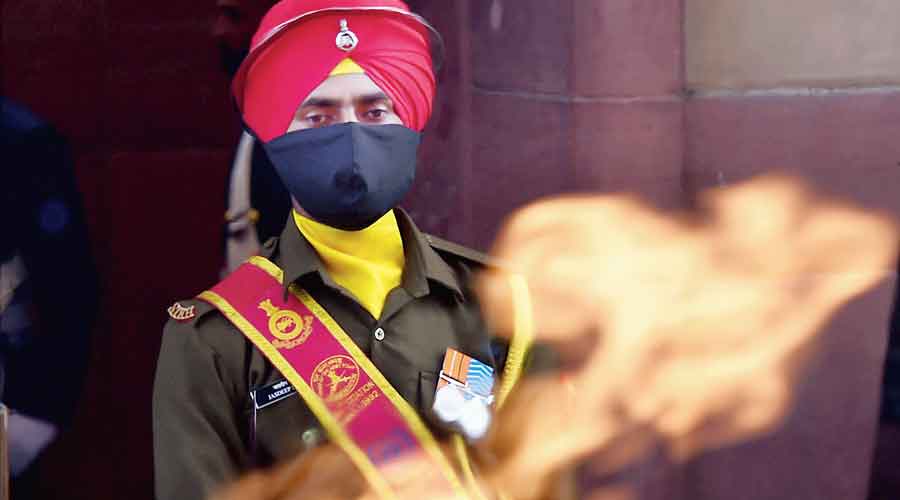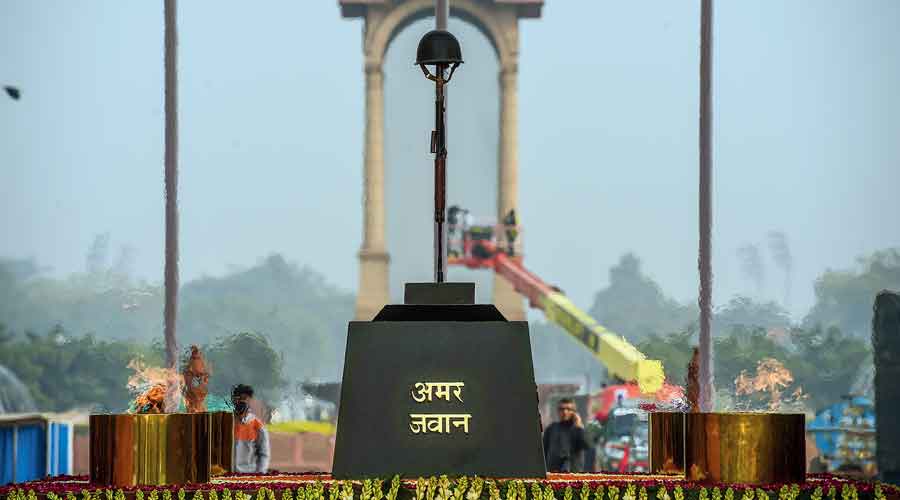Military veterans, Opposition politicians and social media users on Friday castigated the Narendra Modi government for extinguishing the “eternal flame” at the Amar Jawan Jyoti, built in 1972 in tribute to martyred Indian soldiers, saying the act betrayed pettiness and an attempt to erase historical memory.
The flame, which had burnt uninterrupted for 50 years at India Gate, was ceremonially extinguished on Friday evening to be “merged” with that at the National War Memorial, built by the Modi government around 400 metres away.
Air Vice-Marshal (retd) Manmohan Bahadur requested Modi to revoke the decision.
Tagging the Prime Minister, he tweeted: “Sir, the eternal flame at India Gate is part of India’s psyche. You, I & r generation grew up saluting our brave jawans there. While National War Memorial is great, the memories of Amar Jawan Jyoti are indelible. Request rescind decision.”
Congress leader Rahul Gandhi tweeted: “It is a matter of great sadness that the immortal flame that used to burn for our brave soldiers will be extinguished today. Some people cannot understand patriotism and sacrifice — never mind. We will once again light the Amar Jawan Jyoti for our soldiers.”
As public outrage found expression on social media, unnamed government sources sent a clarification of sorts — calling it “PMO sources perspective” — to a WhatsApp group of select journalists.
“The flame of the Amar Jawan Jyoti is not being extinguished. It is being merged with the flame at the National War Memorial,” the message said, opening itself to possible accusations of a mere exercise in semantics.
“It was an odd thing to see that the flame at Amar Jawan Jyoti payed (sic) homage to the martyrs of the 1971 & other wars but none of their names are present there.”
The Amar Jawan Jyoti — whose name invokes the flame — consists of an inverted L1A1 self-loading rifle with the helmet of the “unknown soldier” atop its bayonet, and the “eternal flame” burning in one of the four urns around it.
It was built in 1972, shortly after the 1971 war, under the India Gate arch and was inaugurated by then Prime Minister Indira Gandhi. The memorial mentions no names.
India Gate was built by the British in memory of soldiers of the British Indian Army who died in World War I and the Third Anglo-Afghan War, and has their names inscribed on it.
The WhatsApp message referred to this to portray India Gate as “a symbol of our colonial past”, thus appearing to run down the Amar Jawan Jyoti by association.
It underscored that the names of the Indian soldiers who had died in wars since Independence were all engraved at the National War Memorial. “Hence it is a true shraddhanjali (homage) to have the flame paying tribute to martyrs there,” it said.
A former lieutenant general said the “government sources are completely ignorant of the fact that over 80,000 Indians had also sacrificed their lives during the First World War and the Third Anglo-Afghan War”.
“So much of emotion is attached to India Gate and the Amar Jawan Jyoti. It’s sheer stupidity to say it’s a symbol of our colonial past. The legacy of the Indian Army has roots in the past. Both flames have their own importance,” he told this newspaper.
About-turn
A senior defence ministry official told The Telegraph the government had made a “shocking U-turn” from its earlier stand in 2019 — the year Modi inaugurated the National War Memorial — that the Amar Jawan Jyoti would continue as it was an “inseparable” part of India’s history.
“Why has none from the government come forward to explain the reason behind the latest move? Why is the government talking through anonymous sources?” he said.
Days ahead of the National War Memorial’s inauguration, the then chief of the integrated defence staff, Lt Gen. P.S. Rajeshwar, had said the Amar Jawan Jyoti “will continue to be there”.
“Wreath-laying ceremony on all designated days will be held at the National War Memorial built in memory of soldiers and unsung heroes who have laid down their lives defending the nation since Independence,” he had said.
“A new flame will come up there. But the eternal flame at Amar Jawan Jyoti will stay. We have inherited that flame.”
The three service chiefs have traditionally paid their respects at the Amar Jawan Jyoti on occasions such as Independence Day and Republic Day, doing so also at the National War Memorial since 2019. It appears unlikely that the tradition would continue at the Amar Jawan Jyoti any more.
A senior army official told this newspaper that one reason behind the move to extinguish the Amar Jawan Jyoti flame was the “increasing difficulty in maintaining both flames”.
Questioned, he evaded an explanation. Both flames are lit by gas, supplied continuously through underground pipelines.
Netaji statue
Amid the uproar, Modi on Friday announced that a statue of Netaji Subhas Chandra Bose would be installed at India Gate, some government sources suggesting the announcement was probably timed to deflect the backlash over the flame-dousing controversy.
“At a time when the entire nation is marking the 125th birth anniversary of Netaji Subhas Chandra Bose, I am glad to share that his grand statue, made of granite, will be installed at India Gate. This would be a symbol of India’s indebtedness to him,” Modi tweeted.
“Till the grand statue of Netaji Bose is completed, a hologram statue of his would be present at the same place. I will unveil the hologram statue on 23rd January, Netaji’s birth anniversary.”
Sanjeev Sanyal, principal economic adviser in the finance ministry, described Netaji in a Facebook post as the “first Prime Minister of independent India”.
“What a fitting tribute to Netaji, the first Prime Minister of independent India,” he wrote.
Netaji is widely believed to have died in a plane crash in Taiwan on August 18, 1945, two years before India achieved independence. Jawaharlal Nehru was the first Prime Minister of India.
Ranjona Banerji, a Twitter user, posted: “This is a carefully planned destruction of Independent India. Carefully planned by those who did nothing to fight for India’s Independence.”
Congress MP Shashi Tharoor said: “The sanctity acquired after fifty years of the Amar Jawan Jyoti is being lightly snuffed out. So everything must be reinvented post-2014.”
The leader of the Rajya Sabha Opposition, Mallikarjun Kharge, tweeted: “One cannot even imagine India Gate without the Amar Jawan Jyoti Flame. BJP leaders are proving that they carry forward the legacy of cowards who didn’t participate in the independence movement or nation building. They have no valour, sense of sacrifice & respect for our soldiers.”
RJD parliamentarian Manoj Kumar Jha said: “It is understandable that the present regime may not have a sense of attachment/ belonging with the ‘glories of the past’ but it is beyond comprehension when you resort to such ‘memory erasure’ tactics. It is neither good politics nor good optics.”
Shiv Sena MP Priyanka Chaturvedi asked why both flames cannot remain.
“Eternal Flame will be Extinguished Flame for sometime. How many more ideas & monuments we hold dear need to be reworked to make way for a ‘New India’? Sad & Angusihed. #AmarJawanJyoti PS: Spare me gyaan on merging it with another flame at War Memorial. Why can’t we keep both?” she tweeted.
The National War Memorial spans 40 acres behind India Gate and is dedicated to the soldiers killed in all post-Independence wars and conflicts, including the India-China War of 1962, Indo-Pak wars of 1947, 1965 and 1971, Indian Peace Keeping Force operations in Sri Lanka, the Kargil Conflict of 1999, and UN peacekeeping missions.
It was built at a cost of Rs 176 crore. The names of 25,942 battle casualties are inscribed across its 16 walls.


 (@ranjona)
(@ranjona) 









